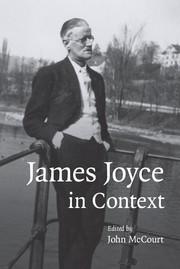Book contents
- Frontmatter
- Contents
- Notes on contributors
- Preface
- List of abbreviations
- PART I LIFE AND WORKS
- PART II THEORY AND CRITICAL RECEPTION
- 4 Genre, place and value: Joyce's reception, 1904–1941
- 5 Post-war Joyce
- 6 Structuralism, deconstruction, post-structuralism
- 7 Gender and sexuality
- 8 Psychoanalysis
- 9 Post-colonialism
- 10 Genetic Joyce criticism
- 11 Translation
- 12 Joyce and world literature
- 13 Twenty-first-century critical contexts
- PART III HISTORICAL AND CULTURAL CONTEXTS
- Further reading
- Index
4 - Genre, place and value: Joyce's reception, 1904–1941
Published online by Cambridge University Press: 14 July 2009
- Frontmatter
- Contents
- Notes on contributors
- Preface
- List of abbreviations
- PART I LIFE AND WORKS
- PART II THEORY AND CRITICAL RECEPTION
- 4 Genre, place and value: Joyce's reception, 1904–1941
- 5 Post-war Joyce
- 6 Structuralism, deconstruction, post-structuralism
- 7 Gender and sexuality
- 8 Psychoanalysis
- 9 Post-colonialism
- 10 Genetic Joyce criticism
- 11 Translation
- 12 Joyce and world literature
- 13 Twenty-first-century critical contexts
- PART III HISTORICAL AND CULTURAL CONTEXTS
- Further reading
- Index
Summary
Joyce's obituary in The Times (London, 14 January 1941) was so grudging that it seems a wonder they bothered to give his death notice at all. T. S. Eliot's passionate response to that august newspaper was to declare Joyce ‘the greatest man of letters of my generation’ and Ulysses ‘the most considerable work of imagination in English in our time’ (CHii 757–8). The Times, however, did not print Eliot's letter of complaint; that was left to the important, and new, literary periodical Horizon. This brief squabble suggests something of the divergence of views met with by Joyce's work in his lifetime: its appreciation – even, for some, devotion – among other young, modern writers and their readership, and its rejection by an ‘older literary generation’ (CHii 757) whose opinions had been cited by the traditionalist obituary writer. Yet the generational division implied by Eliot, between young radicals and older conservatives, only partially explains Joyce's estrangement from such institutions as The Times. After all, Eliot himself, in the early 1940s, was well on the way to becoming a powerful voice of the literary establishment, something like that ‘man of letters’ he found in Joyce. In this respect, it is telling that Joyce had been ‘striving heroically not to be’ a ‘man of letters’, disliking its implications of a pompous and amateurish attitude (MBK 205). The phrase implies the sort of cultural centrality that Joyce could never – and never wanted to – presume.
- Type
- Chapter
- Information
- James Joyce in Context , pp. 41 - 51Publisher: Cambridge University PressPrint publication year: 2009



